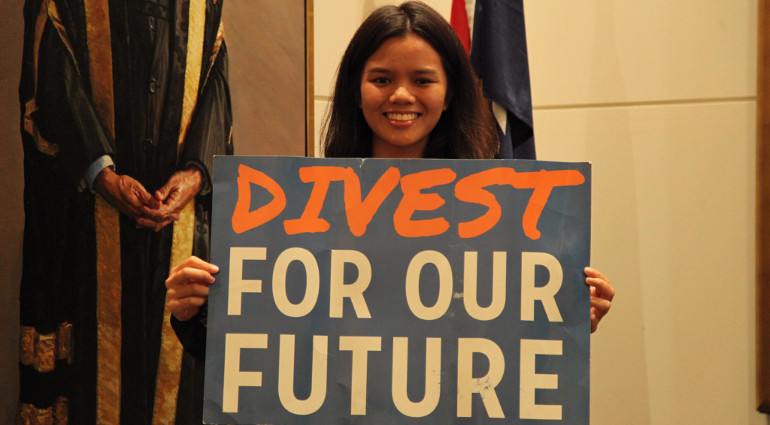Challenging institutional power must be integral to the fight for climate justice

As an activist, I am fascinated by the ways in which climate movements can disrupt systems of power and create opportunities for democracy on more equal terms. I believe that challenges to institutional power should not be incidental to climate movements, but an integral part of the fight for climate justice.
Movements such as People & Planet’s university divestment campaigns demonstrate how groups organising for climate justice can work against established systems of power. On one level, of course, divestment campaigns are motivated by students’ concerns for climate justice, yet on another level they are a demand for greater student input on institutional climate policy. Through organising for divestment, student activists challenge the notion of students as consumers, and work towards a more involved, reciprocal relationship with our universities.
Moreover, through organising with grassroots climate justice groups such as People & Planet young people have the opportunity to learn about horizontal structures. I was drawn to People & Planet because I wanted to be able to act against climate change, and through my involvement with the movement I have gained experience of non-hierarchical structures and consensus decision making. In this way, climate justice movements present an opportunity for young people to learn about non-traditional organisational structures and help them to see that traditional systems of power are not the only possibility.
In recent years, groups such as the school strikers and Extinction Rebellion have succeeded in mobilising millions of school-age children and teenagers, giving them an early introduction to direct action and organising in horizontal structures. How does this affect the ways in which they perceive systems of power as they move through life? I am hopeful that the emerging generation of activists will be increasingly empowered to identify and challenge traditional power structures as an intrinsic part of climate organising.
I feel hopeful, moreover, about the ways that collective solidarity in the climate movement can work against institutional power. Over the last year I have been involved in setting up Leeds Coalition for the Climate, a collective of students and university staff at the University of Leeds working together to critique climate strategy on campus. A student-worker coalition has transformative radical potential: through pooling our spheres of influence and organising experience, we are in a unique position to challenge the university’s climate policy. One of our key priorities is for increased opportunities for consultation, as we believe it is crucial that the university recognises the importance of staff and student participation in shaping climate policy. Through solidarity between students and workers, we agitate for greater involvement in shaping our university.
As activists, we need to question whether our campaigns uphold or challenge systems of power. I believe that rather than acting within existing power structures, we should challenge hierarchies such as those between the student and the university by calling for a more participatory role in institutional climate strategy. My experience of activism has been largely within the university, but I would urge all activists in the climate movement to consider how a practice of climate anarchy could encompass all institutions and empower us to regain control of our futures.
PS. We hope you enjoyed this article. Bright Green has got big plans for the future to publish many more articles like this. You can help make that happen. Please donate to Bright Green now.
Image credit: Kate Ausburn – Creative Commons




I do not understand how giving humanity a chance to avert the disasters awaiting us is possible without a root and branch move away from accumulative capitalism and its automatic companion, the religion of competition, enrichment and consumption.
Technical solutions towards green economics are vital, and achievable given humanity’s remarkable store of technological knowledge.
As of now, our Green Party has played a vital role in bringing ecological awareness into the mainstream, and we have to be in the forefront of fighting against destructive investments, such as high speed trains and building new roads, and we are.
However, replacing competition and self-enrichment with attitudes of cooperation, solidarity, which needs to accompany the technical side, is equally vital for a sustainable future. The Green Party has a policy on Universal Basic Income, like it has on a myriad of liberal and correct issues which groups of members espouse, for instance animal welfare and sexual orientation.
Radical redistribution of wealth and the promotion of new communal values needs to be the the twin of the green issues in our face to the public.
UNIVERSAL BASIC INCOME